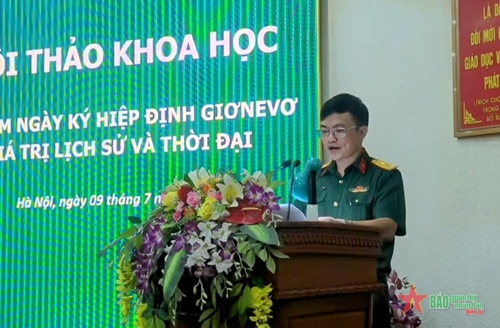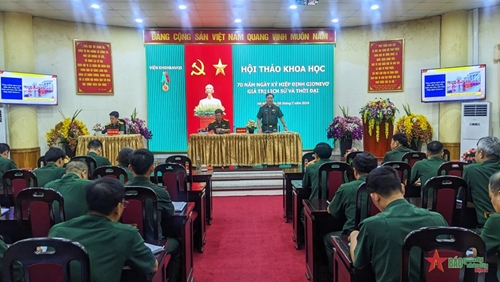Speaking at the event, Senior Colonel Vo Van Hai, Deputy Director of the Institute of Military Social Sciences and Humanities, emphasized that after 75 days and nights with 31 sessions and numerous bilateral and multilateral sidelines activities, the Geneva Conference concluded with significant outcomes. Documents signed at the conference were three agreements on Cessation of Hostilities in Vietnam, Laos, and Cambodia; one final declaration of the conference; two separate statements by the U.S. and French delegations; and exchange notes between Vietnam and France. They formed the legal framework for the 1954 Geneva Accords on Indochina. The participating countries declared their respect for the independence, sovereignty, unity, and territorial integrity of Vietnam, Laos, and Cambodia.
    |
 |
|
Senior Colonel Vo Van Hai addressing the event |
The Geneva Accords, along with the Preliminary Agreement of March 6, 1946 and the Paris Agreement 1973 became the three most important diplomatic documents of Vietnam in the two resistance wars against the French colonialists and U.S. imperialists. They marked significant milestones in the long and arduous struggle for the independence and freedom of Vietnam.
The presentations at the conference unanimously affirmed that the Geneva Accords marked the end of the long and arduous struggle for the independence and freedom of Vietnam.
    |
 |
|
An overview of the seminar |
The Geneva Accords were the first important international legal document that recognized the basic rights of Vietnam at a multilateral conference. Along with the Dien Bien Phu Victory, the Geneva Accords ended the long and heroic resistance of the Vietnamese people against the French colonialists and U.S. intervention, liberating and building the North into a strong homefront to support the cause of Southern liberation and national reunification in 1975.
The Geneva Accords demonstrated the diplomatic prowess of Vietnam. In spite of participating in a multilateral conference in a complex global context where major countries had their own goals and interests, the Vietnamese delegation leveraged the victory on the battlefield and the strength of justice, was consistent in principles but flexible in strategy to achieve important results at the conference. Over the past 70 years, the historical and contemporary values derived from the negotiations, signing, and implementation of the Geneva Accords still hold significance for the country's development, construction, and defense in the new period.
At the seminar, the organizing panel received 50 reports from scientists, contributing to shedding light on the historical values, significance, and precious lessons of the Geneva Conference for the Vietnamese revolution. Its results will contribute to the research, evaluation, and honor of the historical value of the conference, as well as draw valuable lessons for the current task of Fatherland construction and defense.
Translated by Tran Hoai